Iftar and Sehri Timings in Dubai for 2023
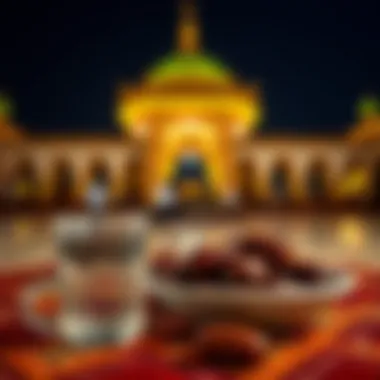
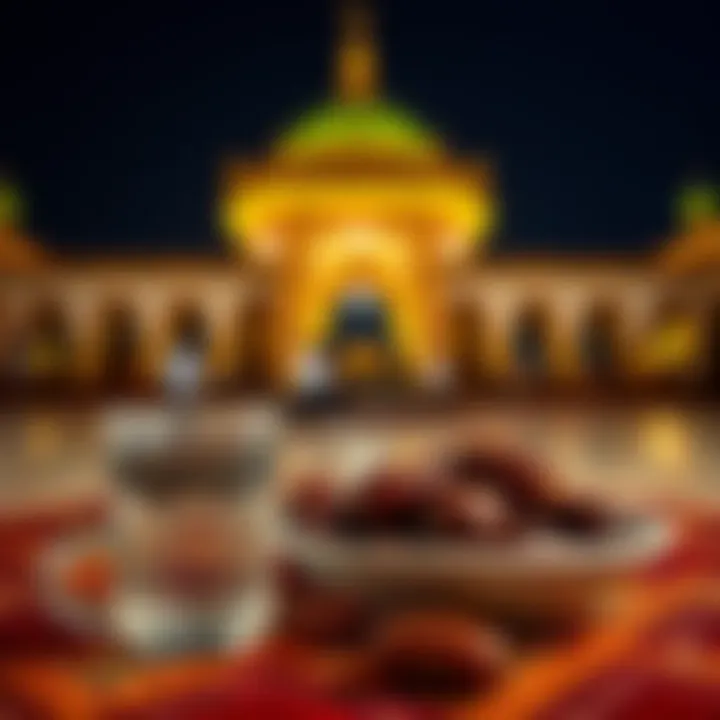
Intro
As the holy month of Ramadan approaches, the significance of timing for Sehri and Iftar assumes a profound importance, particularly in vibrant cities like Dubai. This bustling metropolis, a confluence of tradition and modernity, orchestrates its daily rhythms around unique cultural practices during this sacred time. Understanding the precise timings for these rituals not only enriches the spiritual experience for practitioners but also enhances the convenience for both residents and visitors.
Cultural Significance
The act of fasting during Ramadan is rooted deep within Islamic tradition, being one of the five pillars of Islam. It signifies devotion and community among Muslims. In Dubai, the Iftar, which marks the breaking of the fast at sunset, often transforms into grand gatherings, ranging from communal meals in public squares to intimate feasts at home. Meanwhile, Sehri, the pre-dawn meal, is an opportunity for families to connect before the day's fasting begins.
The timing of these meals varies slightly each day throughout the month, influenced by natural cycles. The specific timings hold a dual importance: they guide personal observance and frame social interactions. Whether one is a long-time resident or a visitor drawn to the city during this special period, knowing the exact timings can help foster an enriching experience.
Practical Considerations
For those looking to partake in the nighttime festivities or simply navigate their daily life during Ramadan in Dubai, it's essential to consult local schedules. Local mosques and community centers often publish detailed timetables, adjusted for the peculiarities of lunar phases that dictate Islamic months.
Many apps and online services also provide up-to-date information on Iftar and Sehri timings, accommodating the dynamic nature of fasting hours. This integration of technology makes it even easier for people to observe their schedules without a hitch, contributing to a cohesive living experience during a time that’s both spiritually significant and socially vibrant.
Understanding Ramadan Observances
Ramadan marks a significant period for Muslims worldwide, serving as a time for reflection, self-discipline, and spiritual growth. Understanding the observances associated with this holy month adds depth to its character and context, especially in a cosmopolitan city like Dubai, where diverse cultures converge under the banner of respect and tolerance.
Engaging deeply with the principles and practices of Ramadan helps illuminate the importance of iftar and sehri. Observing these rituals is not merely about adherence to tradition; they echo the core tenets of faith, community, and compassion. When one comprehends Ramadan's essential aspects, they grasp the intricate connection it has with daily life, ultimately enhancing both community cohesion and individual spirituality.
Key elements in comprehending Ramadan observances include:
- The spiritual significance of fasting, which encourages introspection and empathy towards the less fortunate.
- The social aspects that come into play during this month, fostering stronger bonds among community members through shared meals and experiences.
- The transformative effects of discipline, where controlled behavior during fasting can lead to a sense of accomplishment and resilience.
Additionally, as the holy month progresses, it becomes essential for both residents and visitors in Dubai to recognize the various customs that intersect with iftar and sehri. For instance, the communal spirit at iftar meals often reflects Dubai's ethos of hospitality; breaking bread with neighbors and friends reinforces social ties.
Taking the time to understand these observances not only enhances one’s participation during Ramadan but also enriches the experience of living within this vibrant, multicultural city. Ultimately, understanding the unique fabric of Ramadan observances sheds light on how deeply embedded these practices are within the social and cultural architectural world of Dubai.
Overview of Iftar and Sehri
Understanding the significance of iftar and sehri during Ramadan goes beyond merely marking the beginning and end of fasting each day. These two moments are steeped in rich cultural traditions and provide insights into the lifestyle and community spirit prevalent in Dubai during this holy month.
Iftar, the meal consumed after sunset, signifies the end of the day's fast and is often regarded as a moment of reflection and gratitude. People gather in homes, mosques, and public spaces to break their fast together. On the contrary, sehri is the pre-dawn meal that fortifies individuals for the day of fasting ahead.
Both mealtimes offer distinct opportunities for spiritual connectivity, culinary delight, and social interactions, making them central aspects of Ramadan. Their timings, however, are not arbitrary; they are based on the natural occurrences of sunset and dawn, which is vital for anyone observing the fast.
Defining Iftar and Sehri
Iftar can be described as a communal celebration of nourishment and fellowship. It typically begins with the recitation of a prayer and the tasting of dates and water, followed by a vast array of dishes ranging from biryanis to sweets. On the flip side, sehri is about waking up before dawn to ensure one is prepared for the long day of fasting. This meal varies dramatically from simple sustenance like bread and cheese to elaborate spreads, reflecting the diverse culinary influences within Dubai.
Both meals are approached with specific intentions. Iftar is a time to reflect on the hardships faced by those less fortunate, encouraging a spirit of charity. Sehri serves as a reminder to nourish oneself in preparation for challenges ahead, symbolizing the resilience and strength that Muslims draw upon during this time.
Timing Regulations and Influences
The timings for both iftar and sehri are dictated by astronomical calculations. The precise moments change daily, necessitating keen awareness among observers of Ramadan. In 2023, in Dubai, iftar generally occurs around the time of the Maghrib prayer, which is signified by the setting of the sun. As this timing shifts throughout the month, keeping track of the specific timings becomes essential.
Sehri, in contrast, must be completed before Fajr, the dawn prayer. This time frame can be somewhat tricky, especially as the days lengthen, greeting the early riser with a darker sky that might deceive their sense of time. The most significant influence on these timings is the practice of sighting the moon, which traditionally culminates in the commencement and conclusion of Ramadan itself.
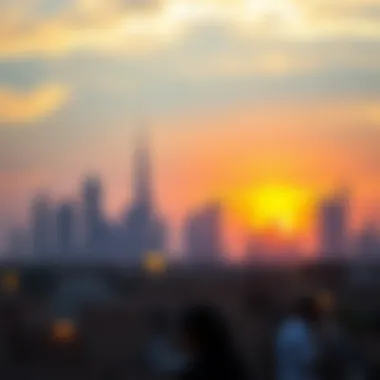
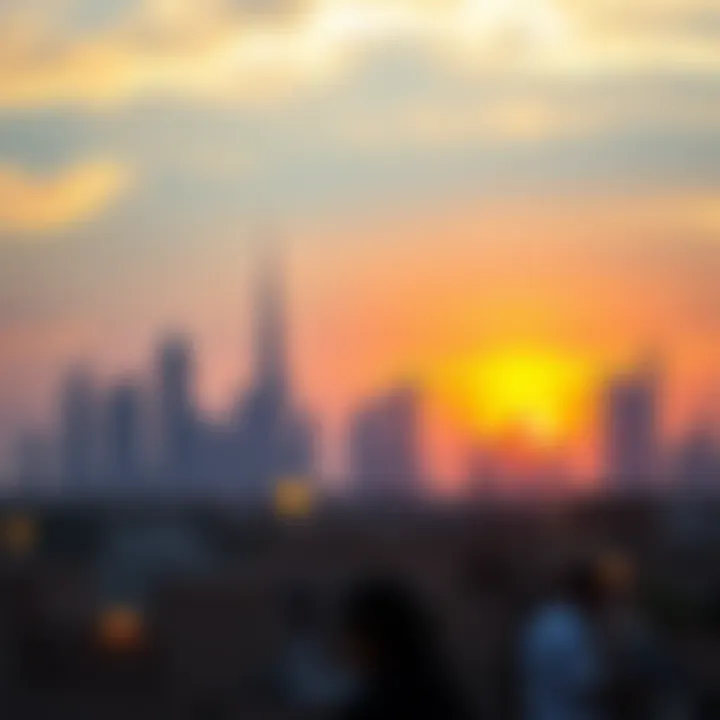
"Understanding the dynamics of iftar and sehri timings is crucial for observers, as it not only shapes their daily routine but also reinforces their spiritual commitments during this month."
Ultimately, comprehending these elements about iftar and sehri enriches the entire Ramadan experience, making it both a personal and community affair. This understanding aids investors, homeowners, and real estate professionals in navigating the cultural intricacies that guide local rituals, making interactions with potential clients in this region sensitive and informed.
For accurate timing and further reading on Islamic calendar practices, resources such as the Moon Sighting Committee or local cultural websites are recommended to stay updated with the daily changes.
Iftar and Sehri Timings in Dubai
Iftar and Sehri timings play a crucial role during Ramadan, especially in a culturally rich city like Dubai. The daily rhythm shifts significantly as Muslims break their fast after sunset and prepare for the day ahead with a pre-dawn meal. Understanding these timings not only enhances one's spiritual experience but also aligns daily activities with the local community practices. As everyone from loyal residents to curious visitors partakes in this sacred month, grasping the nuances of these timings becomes essential for a fulfilling Ramadan experience.
Iftar Timings
Daily Schedule
The daily schedule for Iftar in Dubai sees communities come to life as the sun dips below the horizon. Usually, the call to prayer, known as Adhan, signals the time for breaking fast. Throughout Ramadan, this can happen around 6:30 PM to 7:00 PM, depending on the specific date. It is an opportune moment for families and friends to gather, sharing meals that range from dates to elaborate dishes. A unique feature of this schedule is how it cultivates a sense of unity; the entire city pauses to honor the Sundown moments together. While advantageous for social interaction, a disadvantage could be the crowded restaurants as people flock in.
Variability Based on Date
The timings for Iftar vary day by day due to the lunar calendar. As Ramadan progresses, the sunset shifts slightly later each evening. For example, on the first day of Ramadan, Iftar might happen around 6:30 PM, but by the end, it could stretch to approximately 7:00 PM. This rolling change means that people must stay informed about when to break their fast daily. Finding a reliable source to keep track of these timings is critical so individuals don't miss that important window. It encourages attention to detail which can sometimes be overlooked.
Significance of Sunset
The sunset holds profound significance during Ramadan. It is more than a mere marker for breaking fast; it symbolizes reflection and gratitude. As the sun descends, Muslims pause to thank Allah for the blessings of the day and the strength to complete their fast. The unique aspect of praying at this very moment provides a serene and contemplative atmosphere, fostering deeper connections with faith. However, it can also lead to various distractions, like the excitement of gathering with loved ones or the rush to prepare meals, which might detract from that focused reflection.
Sehri Timings
Daily Schedule
Sehri, the predawn meal, is as vital as Iftar. This meal typically begins at around 4:00 AM and comes to a close just before the Fajr prayer, which predicates the fast. Many people indulge in hearty meals to sustain themselves through the day. A distinct feature of this schedule is the peaceful ambiance it brings, as many people savor their final bites in silence or in prayer. Yet, waking up early comes with its challenges, especially for those unused to such a routine.
Variability Based on Date
Likewise to Iftar, Sehri timings shift gradually, with the last meal of the night occurring slightly earlier each day as the days lengthen. Early in Ramadan, a person might Friday a hearty meal at 4:00 AM, but just a few weeks later, it may need to be consumed by 3:30 AM. This ongoing adjustment requires individuals to remain vigilant about their Sehri timing to prevent any hiccups in their fasting. It fosters both anticipation and discipline as each day comes with its own set of challenges and adjustments in routine.
Significance of Dawn
The dawn moments hold immense spiritual weight, similar to sunset. As the day begins, many Muslims engage in prayers and meditation, connecting with their faith before embarking on another fast. This time of day symbolizes hope and renewal, as the sunlight breaks through the night. It certainly encourages a reflective start to the day, but the early hour can also take its toll on sleep-deprived individuals, presenting a double-edged sword of reflection and fatigue.
"The beauty of Iftar and Sehri is not only in the meals shared but in the connections formed, the prayers whispered, and the community embraced."
Understanding the iftar and sehri timings isn't just about eating; it's a cultural and spiritual journey that intertwines with the very fabric of life in Dubai during Ramadan. By carefully navigating this schedule, individuals can immerse themselves in the local traditions and truly experience the essence of the holy month.
Resources for Accurate Timing
In the context of Ramadan, the significance of accurate timings for Iftar and Sehri cannot be overstated. Precision in these times is essential, not only for those observing the fast but also for organizations and communities that support this sacred month. When fasts begin or end, particularly in a place like Dubai, the atmosphere changes; it is a moment of pause and reflection. This is where reliable resources come into play.
By utilizing the right tools and references, one can ensure they are aligning with both local customs and religious practices. Accurate timings not only allow for timely meals but also usher in an understanding of shared experience among those participating in Ramadan activities. It benefits a wide range of stakeholders, from residences to businesses and tourists alike, empowering them with the right schedule that matches local observances.
Islamic Authorities and Their Role
Islamic authorities play a pivotal role in dictating the times for Iftar and Sehri. In Dubai, the Islamic Affairs and Charitable Activities Department is the main body responsible for releasing official timings. They use astronomical calculations alongside traditional moon sightings to announce the beginning of Ramadan, which in turn determines the schedule for daily fasts.


Moreover, local mosques often provide community calendars that specify these times. Here, it becomes evident that there is a strong reliance on both ancient traditions and modern science to create a calendar that serves everyone accurately. As the sun sets and rises at different points throughout the month, daily adjustments to timings are necessary, and Islamic authorities ensure these changes are communicated effectively.
"The adherence to precise prayer and fasting times reflects the organization and communal respect that Ramadan inspires among Muslims."
It's worth noting that while the official timings set by authorities guide many, the fluid nature of timing means that individuals may confirm with their local mosque or community gatherings to ensure they follow the correct schedule. This practice accentuates the importance of community during Ramadan, providing a sense of unity.
Mobile Applications and Tools
In today’s digital age, the rise of mobile applications has complemented traditional methods of tracking Iftar and Sehri timings. Various apps cater to the needs of those observing Ramadan — providing more than just time; they offer reminders, prayer notifications, and even curated recipes to break the fast.
Key among these is the Muslim Pro app, which features an interactive interface for users to find the exact times based on their location. Another popular choice is IslamicFinder, known for its simplicity and user-friendliness. These tools aren't just for locals but are also immensely useful for travelers and expatriates, helping them adapt to the differences in timing based on the geographical nuances of Dubai.
In addition to mobile applications, some websites also provide live updates based on lunar sightings. Websites like IslamicFinder.org and Al-Islam.org include detailed sections dedicated to Ramadan, further facilitating real-time changes in local schedules. Through these technological innovations, individuals can ensure they are observing Iftar and Sehri at precise times, eliminating confusion and enhancing the overall experience of Ramadan, which is crucial for both spiritual and community engagement.
Culinary Traditions during Iftar
The culinary practices during Iftar are more than just a means to break the fast; they are a tapestry woven into the cultural fabric of Ramadan. Each dish serves a dual purpose, not only satisfying hunger after a long day of fasting but also keeping the communal spirit of Ramadan alive. The act of sharing these meals plays an essential role in fostering connections among families, friends, and even strangers who gather to share in this moment of gratitude and reflection. It showcases the diversity of culinary art prominent in Dubai, where flavors from across the globe blend seamlessly.
These traditions often involve the preparation of special dishes that are typically served only during this holy month. Embracing unique local flavors while respecting traditional recipes enhances the entire Ramadan experience. Moreover, the culinary scene during Iftar is influenced by trends and innovations, making it a dynamic field worthy of exploration. Hence, understanding these traditions provides significant insight into the broader cultural observances associated with Ramadan in Dubai.
Typical Iftar Dishes
Iftar meals in Dubai are a gastronomic delight, often featuring a variety of dishes that are staples in Emirati cuisine. One beloved item is Dates, which hold religious significance and are commonly eaten to break the fast. Their naturally sweet flavor and rich energy content make them the perfect choice to restore vitality.
Following dates, Laban (a yogurt drink) is widely consumed. It serves as a refreshing drink that aids in rehydration after fasting. Another frequent highlight is Sambousek, savory pastries filled with cheese, meat, or vegetables, often deep-fried or baked to golden perfection.
Moreover, the table might feature Harees, a dish made with wheat and meat, which is both hearty and comforting. To add depth to the meal, dishes like Roasted Lamb or Chicken Machbous—a spiced rice dish—often make an appearance. Each dish is prepared with love, reflecting the spirit of Ramadan and hospitality that resonates strongly in the community.
Emerging Trends in Iftar Meals
With the evolving dynamics of food habits, particularly among younger generations and expatriates, several trends are shaping the Iftar dining experience in Dubai. Plant-based meals are becoming increasingly popular as people seek healthier choices and align with eco-conscious practices. Restaurants are responding by offering innovative vegan and vegetarian options, which blend traditional flavors with modern dietary preferences.
Another trend making waves is the global fusion of cuisines, where traditional Iftar dishes intermingle with international flavors. For example, you might find a Sushi Iftar, where sushi rolls are filled with middle-eastern ingredients, or Italian-themed Iftar meals that feature pasta paired with spices typical of the region. This fusion reflects the multicultural essence of Dubai, allowing residents and visitors alike to explore culinary creativity.
The rise of gourmet Iftar boxes is also notable. Many restaurants now offer pre-packaged Iftar meals, elegantly curated and available for delivery. This not only adds convenience but also encourages people to celebrate Ramadan at home, aligning with social distancing norms from recent years.
Significance of Community During Ramadan
During Ramadan, the fabric of community is woven tighter than ever, reflecting both spirituality and solidarity. The significance of community cannot be underestimated, particularly in a cosmopolitan city like Dubai, where diverse cultures intermingle. The communal aspect of Iftar and Sehri transcends mere meal consumption; it represents a vital connection among individuals, families, and friends.
Sharing the daily Iftar meal after a long day of fasting is not only a practice dictated by tradition but rather a cherished event fostering unity. Families and neighborhoods gather together, creating an atmosphere rich with laughter, conversation, and shared experiences. In Dubai, you can find lively communal Iftar events in parks, community centers, and even rooftop terraces, where the spirit of togetherness flourishes against the stunning skyline.
This coming together also allows for the exchange of cultural practices. Whether it's a traditional dish from Sudan or a popular sweet treat from Turkey, the variety of foods presented during Iftar offer a glimpse into the myriad backgrounds of the city's inhabitants. These gatherings promote understanding and appreciation of different cultures, reinforcing the bonds of friendship and community.
Additionally, Ramadan provides a time for reflection, and togetherness acts as a catalyst for personal growth and social well-being. When people engage in playful banter over shared meal preparations or recount past Ramadan memories, the resulting laughter and joy elevate the communal spirit.
"Community is not just about being together; it is about the understanding and growth that come from shared moments."
Collective Iftar Gatherings
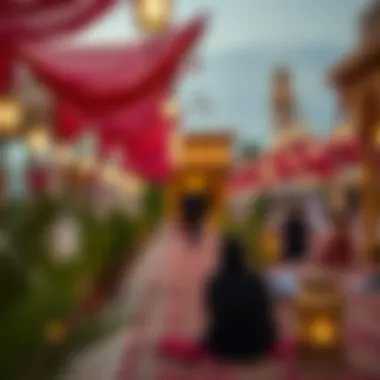
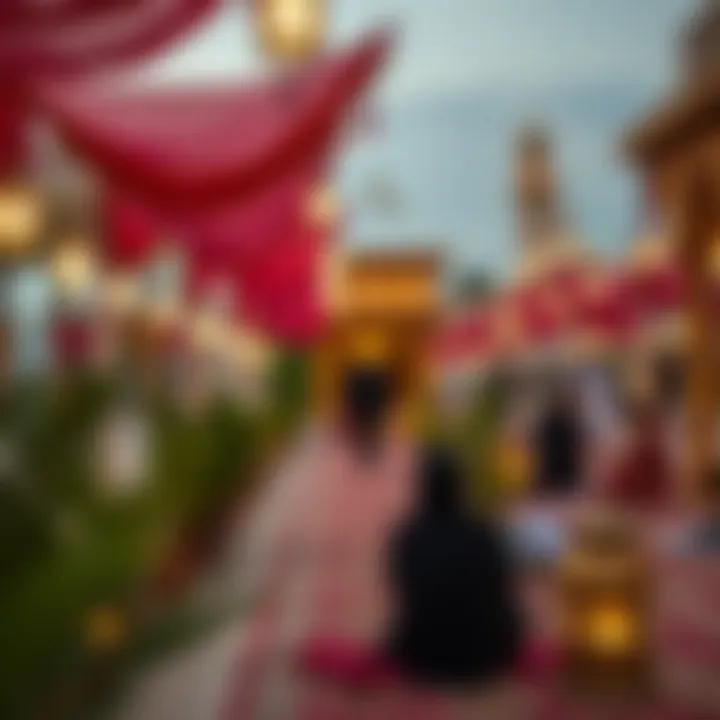
Collective Iftar gatherings hold immense charm in Dubai, particularly during Ramadan. These events can range from intimate family dinners to grand buffets in hotels and restaurants that invite the greater public to partake. They serve as communal hubs where individuals, regardless of their backgrounds, participate equally in breaking their fast. This act of unity exemplifies the true essence of Ramadan is not just a personal journey of piety but a shared experience that encourages social connections.
People often find themselves invited to community Iftars that attract large crowds, offering a sense of belonging amid the hustle and bustle of city life. One popular venue is the Burj Khalifa, where the vast open plazas become gathering spaces for residents and tourists alike.
The atmosphere is charged with energy; as the resonates through the air, hearts and stomachs fill in unison. These events foster inclusivity, permitting everyone to broaden their social circles while indulging in rich culinary delights traditionally prepared for Ramadan.
The Role of Charity
Charity holds a sacred place in Ramadan, with community service becoming a focal point. During this month, acts of kindness take center stage, giving rise to what many call 'Zakat' - obligatory charity. In Dubai, there are various organizations that facilitate distributions, ranging from supplying meals for the needy to funding educational programs.
The ability to give back and participate in charitable activities is pivotal for both the giver and receiver. For those who donate, it cultivates gratitude and empathy toward others. At the same time, beneficiaries experience not only nourishment but also a sense of dignity and respect during a month focused on spirituality.
Furthermore, social media plays a powerful role in promoting charitable initiatives during Ramadan. From local businesses to global firms, many leverage their platforms to encourage donations and volunteer work. Initiatives that encourage such engagement not only strengthen community bonds but also highlight Dubai's compassionate nature, making it a city known for its generosity.
With the spirit of giving flowing freely, community members find they grow closer, forging connections that can last long after Ramadan concludes.
Challenges for Residents and Visitors
Understanding the challenges faced by residents and visitors during Ramadan, especially concerning iftar and sehri, is pivotal for a seamless experience in Dubai. The holy month is not only a time for fasting but also imbued with cultural practices that can pose hurdles for outsiders. Knowledge of these customs not only enhances appreciation but also facilitates smoother interactions, encouraging a sense of belonging and respect for local traditions.
One of the primary challenges revolves around the local customs associated with iftar and sehri. For residents and tourists alike, adapting to the modified daily schedules during Ramadan can be quite disorienting. Shops may operate on shortened hours, and meal availability becomes concentrated around these key eating periods. Additionally, those unaccustomed to fasting may find themselves navigating a social landscape where food is often hidden in public view during the day. Some restaurants may close entirely, while others might only serve iftar after sunset. This can be confusing for tourists unfamiliar with the local practices, making advance planning essential.
Moreover, there’s the unique element of community gatherings. The communal aspect of iftar can be a beautiful experience filled with sharing and hospitality, but for non-Muslims, integrating into these gatherings may pose difficulties. Invitations can be extended informally, so understanding the local etiquette is crucial. Being aware of when and where these events take place can help outsiders engage respectfully and joyfully with local traditions.
"It's not just about the meal; it's about the moment shared and the connection made during iftar. Knowing the nuances can enrich the experience immensely."
Navigating Local Customs
Diving into the nuances of local customs reveals a tapestry woven with tradition and respect. Residents and visitors must grasp the expectations surrounding iftar and sehri to avoid unintentional faux pas.
During the day, particularly from dawn until sunset, it is customary to refrain from eating and drinking in public spaces. This practice respects those who are fasting and is a cornerstone of the collective experience of Ramadan. For many expats, this is a significant adjustment, as public dining isn't just a lifestyle but often a habit.
For those wanting to join in on the iftar, key customs include arriving on time, as the meal often begins precisely at sunset. Participating in the rituals, such as breaking the fast with dates and water, can deepen respect for the customs. Visitors should also be mindful of their attire during this month; dressing conservatively is usually appreciated and helps in showing respect to the local culture.
Practical Considerations for Non-Muslims
For non-Muslims, navigating the practical considerations surrounding iftar and sehri entails not just awareness, but also planning ahead. Here are a few tips that might help:
- Dining Options: Research restaurants that offer iftar meals beforehand, as some places might require reservations.
- Know the Timing: Being informed about the specific timing for iftar is crucial. Daily schedules can vary, so utilizing local mobile applications or checking community calendars helps in keeping track.
- Cultural Etiquette: Understanding that during Ramadan, public displays of eating or drinking are generally discouraged is vital. Staying hydrated in private spaces and moderating habits is encouraged.
- Communicate Respectfully: If invited to participate in iftar, it’s a token of hospitality. Accept it graciously and strive to engage with the customs. This heartfelt acknowledgment can foster stronger bonds with local communities.
Embracing these considerations not only smoothes the path for a positive experience but also enriches the worldly perspective for both residents and visitors, creating a harmonious atmosphere during this sacred time.
The End
As the holy month of Ramadan comes to a close, the reflections on the significance of Iftar and Sehri timings extend beyond the mere act of eating. These moments encapsulate the enduring spirit of community, faith, and resilience observed during this pivotal period. Grasping the nuances of the fasting schedule in Dubai not only provides a framework for daily life during Ramadan but also highlights the broader cultural practices that characterize this city.
The importance of accurately understanding the timings lies in fostering respect for local customs. With knowledge, residents and visitors alike can engage more meaningfully in the rituals surrounding fasting. People learn to gather for Iftar, breaking fast together, sharing meals that are rich in flavor and tradition. Similarly, during Sehri, the pre-dawn meal often becomes a quiet reflective experience that sets the tone for the day ahead.
Reflecting on the Experience of Ramadan
By immersing in these practices, individuals not only partake in a tangible aspect of Ramadan but also connect with the essence of spirituality that it embodies. Observing the daily shifts in the timing of these rituals can help foster a deeper appreciation of the natural cycles and the respect towards one's body and community. The collective experiences during fasts lead to a sense of camaraderie, bridging gaps between diverse backgrounds, and reminding participants of shared human experiences.
Engaging with the local population during Iftar or joining a Sehri gathering can greatly enrich one's understanding of the cultural landscape of Dubai. Thus, the time taken to comprehend these practices ends up being a profound investment in building relationships and enhancing social interactions.
"During Ramadan, the shared meal becomes less about food and more about the love and connections formed around it."
For further details about Ramadan and its practices, resources like Wikipedia and Britannica can provide extensive insights.















